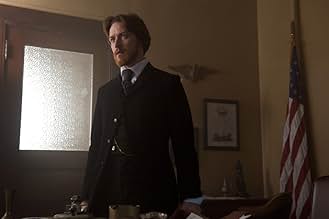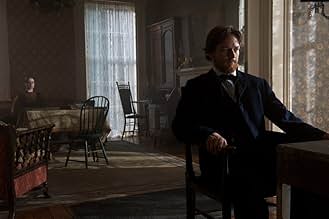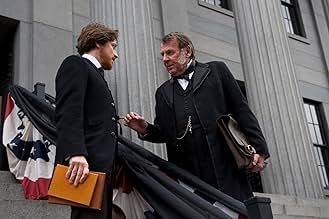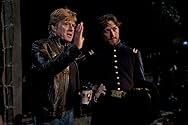A Mary Surratt la acusan de cómplice en el asesinato de Lincoln. A medida que la nación se pone en su contra, se ve obligada a confiar en su abogado para descubrir la verdad.A Mary Surratt la acusan de cómplice en el asesinato de Lincoln. A medida que la nación se pone en su contra, se ve obligada a confiar en su abogado para descubrir la verdad.A Mary Surratt la acusan de cómplice en el asesinato de Lincoln. A medida que la nación se pone en su contra, se ve obligada a confiar en su abogado para descubrir la verdad.
- Dirección
- Guionistas
- Elenco
- Premios
- 2 premios ganados y 3 nominaciones en total
Opiniones destacadas
Robert Redford has been well known for his political views and has displayed them already in the somewhat uneven Lions for Lambs. I like filmmakers who speak out. I can maybe not always agree, but I wholeheartedly admire that in this time of mindless action drivel like Transformers, Drive Angry and The Mechanic there is still hope for without trying to be arrogant: meaningful films. Redford uses the assassination of Lincoln to portray a nation in mourning and sadness. The Civil War was all but over and the policymakers were already planning the next step: the forming of a real Union. The assassination of Lincoln endangered the entire Union. The people wanted revenge and Edwin Stanton (an excellent Kevin Kline) serves it cold. Since her son is nowhere to be found anywhere, he settles for the next thing: his mother Mary Surrat. 'I don't care which one it is, as long as one of them pays the price'. Young Frederick Alken (James McAvoy) has the ungrateful task of defending her.
I don't know much about the Civil War and the period after that, so I can't say how accurate this film is. But what I can say is that it's a masterpiece in creating a period not so distant from our current world. If you replace the assassination of Lincoln with the 9/11-attacks, you have a film that stands firm. It asks relevant questions and holds a mirror right up to our faces. Are seeing clearly? In the sadness and outrage of such a shocking event, do we still see clearly what's going on? Do we still, as a people, have perspective enough to define friend from foe from guilty to innocent? Do our leaders have the capability, strength and courage to make us see or tell us 'no' when we are wrong? Or do policies, political views or elections hold them back and make them just give the public what they want? Mary Surrat, Lincoln, Osama Bin Laden, Afghanistan, Bush, Edward Stanton, Abu Grahib, post Civil War Washington, Guantanomo Bay. History repeats itself over and over again. When will we learn? Guilty or innocent. Is it important? Do we care? I give this film 8 out of 10.
Stealthily entering the President's box, Booth shoots Lincoln in the head, then leaps onto the stage shouting "sic semper tyrannis" (thus always to tyrants), and escapes on horseback. The assassination results in an outpouring of grief all over the country, and prompts the Secretary of War, Edwin Stanton (Kevin Kline) to vow revenge against the conspirators. After a two week search, Booth is found hiding in a nearby barn and shot to death, while seven suspected co-conspirators are arrested including Mary Suratt. Suratt is tried by a military tribunal where the rules state that only a majority vote is required for a guilty verdict and a two-thirds vote is needed to sentence a defendant to death. It is a court where a defendant is prohibited from testifying in their own defense.
Senator Reverdy Johnson (Tom Wilkinson) from Virginia and a former U. S. Attorney General agrees to defend Suratt on the grounds that she is innocent until proved guilty. The Senator, however, withdraws because he fears that being a Southerner might prejudice his case, and asks Frederick Aiken (James McEvoy), a northern attorney to defend her. Initially reluctant and dubious about her story, Aiken resolves to prove her innocence after seeing that the defendant was up against an overbearing prosecutor (Danny Huston), a biased head of the tribunal (Colm Meany), and the behind-the-scenes antagonism of Secretary Stanton.
At great cost to his personal life, Aiken tries to prove that Ms. Suratt knew the boarders who lived in her house, but was not involved in their conspiracy. As the case progresses, it becomes apparent that only her son John (Johnny Simmons), a known conspirator who fled to Canada, can save his mother by surrendering. While there is limited dimension to the characters, The Conspirator is true to the historical record and the film presents its message in a clear and powerful way. Redford, long a champion of civil liberties, implicitly reminds us that the Fifth Amendment to the U.S. Constitution expressly guarantees that "no person shall be deprived of life without due process of law" and provides no exception for war.
It is not only an important message for those unfamiliar with our nation's history, but is strikingly relevant to the present day in which hundreds of detainees at Guantanamo still languish in prison without trial, where a U.S. citizen, suspected of terrorist activities, is targeted for an assassination attempt without having been charged with, let alone convicted of, any crime, and where the ideal of due process and the presumption of innocence is slowly being replaced by unlimited violence, the repudiation of legality, and the undermining of democracy.
The film opens with some scenes from the Civil War battlefield where we meet the severely wounded soldier Frederick Aiken (James McAvoy) attempting to save the life of his buddy Nicholas Baker (Justin Long). The film then jumps to the end of the war when the Confederate generals have surrendered to the Union generals and parties are underway. Aiken and Baker have survived and Aiken has decided to pursue law. The President is assassinated by John Wilkes Booth and in the aftermath Booth is killed but it is discovered that there was a plot to kill Lincoln as well vice president Andrew Johnson (Dennis Clark) and secretary of state (Kevin Kline). The response of the nation is terror and the suspects of the conspiracy are arrested and set for trial. The conspirators had been meeting in the boarding house of Mary Surratt (Robin Wright) so the military decides she must also be a conspirator and tried with the others 'to put this madness to an end.' The men in charge of the tribunal include Joseph Holt (Danny Huston) and David Hunter (Colm Meaney). There is one lawyer, Reverdy Johnson (Tom Wilkinson) who feels that the tribunal is not an acceptable manner in which to try a citizen and assigns the fresh new lawyer Frederick Aiken to defend Mary Surratt. At first Aiken hates his role but as time passes and he gets to know Mary Surratt he is convinced of her innocence and implores Mary (and Mary's daughter Anna - Evan Rachel Wood) to reveal the location of the true problem in their family - Mary's son John (Johnny Simmons). The story features the change of approach of Aiken and the abuse of justice at the trial and the film ends with some very poignant lessons not only about our history but also about our present.
The pacing of the film is slow at times, but the cinematography by Newton Thomas Sigel and the musical score my Mark Isham keep the film involving. James McAvoy offers a sterling performance and the rest of the cast is impressive. THE CONSPIRATOR is a healthy dip into our nation's past and makes us more alert to our nation's present.
Grady Harp
¿Sabías que…?
- TriviaThe Surratt boarding house still stands in Washington, DC's Chinatown.
- ErroresWhen Booth is trapped and killed, he still has his distinctive mustache. He shaved his face soon after he killed Abraham Lincoln, to make himself less recognizable.
- Citas
Edwin Stanton: Young man... always indebted to you for your courage in the field, but you must learn to tread lightly.
Frederick Aiken: Tread lightly? I will not tread lightly. You have predetermined her fate.
Edwin Stanton: Mary Surratt's fate rests entirely with the Commission. My concern is preserving our Union.
Frederick Aiken: Why did I fight for the Union if my rights aren't assured? You tell me.
Edwin Stanton: Fine words for rallying the troops, not for running a nation. They assassinated our president, and someone must be held accountable. The people want that.
Frederick Aiken: It's John Surratt you want. You don't even want Mary.
Edwin Stanton: I'll settle for either one.
- ConexionesFeatured in The Conspirator: Mary Surratt and the Plot to Kill Lincoln (2011)
Selecciones populares
Detalles
- Fecha de lanzamiento
- País de origen
- Idiomas
- También se conoce como
- The Conspirator
- Locaciones de filmación
- Fort Pulaski, Georgia, Estados Unidos(Exterior)
- Productoras
- Ver más créditos de la compañía en IMDbPro
Taquilla
- Presupuesto
- USD 25,000,000 (estimado)
- Total en EE. UU. y Canadá
- USD 11,538,204
- Fin de semana de estreno en EE. UU. y Canadá
- USD 3,506,602
- 17 abr 2011
- Total a nivel mundial
- USD 15,625,544
- Tiempo de ejecución2 horas 2 minutos
- Color
- Mezcla de sonido
- Relación de aspecto
- 2.39 : 1
Contribuir a esta página












































